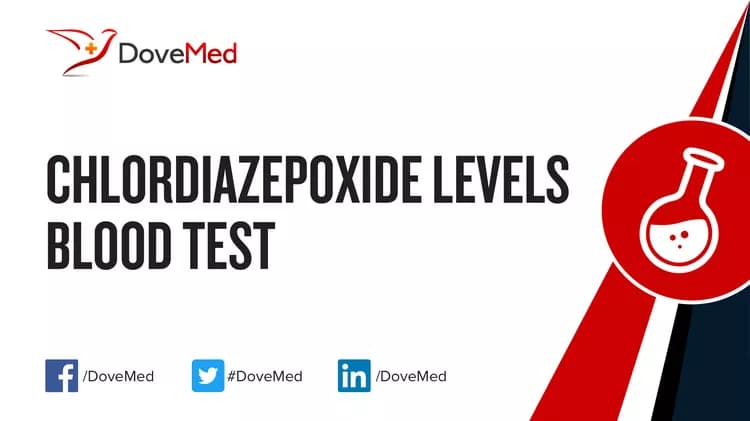What are other Names for this Test? (Equivalent Terms)
- Librax Levels Blood Test
- Librium Levels Blood Test
What is Chlordiazepoxide Levels Blood Test? (Background Information)
- Chlordiazepoxide is an antianxiety medication used to treat anxiety as well as seizures and alcohol withdrawal symptoms
- Chlordiazepoxide is a type of medication called a benzodiazepine. This is because of its chemical structure. Benzodiazepines cause sleep-inducing, antianxiety, and overall taming effects
- The method by which chlordiazepoxide treats anxiety is unknown
- Chlordiazepoxide remains in blood for 4-8 days after intake. It is excreted through the kidneys
- Like every other drug, chlordiazepoxide must be kept within a certain range to prevent unwanted side effects. If levels are too high, toxicity may result; if levels are too low, the drug may not successfully combat anxiety, seizures, and alcohol withdrawal symptoms
- The Chlordiazepoxide Levels Blood Test helps determine the level of chlordiazepoxide in blood. It is used when adjusting the initial dose, and to ensure that chlordiazepoxide levels stay within an acceptable range
What are the Clinical Indications for performing the Chlordiazepoxide Levels Blood Test?
The clinical indications for performing the Chlordiazepoxide Levels Blood Test include monitoring chlordiazepoxide therapy.
How is the Specimen Collected for Chlordiazepoxide Levels Blood Test?
Following is the specimen collection process for Chlordiazepoxide Levels Blood Test:
Sample required: Blood
Process of obtaining blood sample in adults:
- A band is wrapped around the arm, 3-4 inches above the collection site (superficial vein that lies within the elbow pit)
- The site is cleaned with 70% alcohol in an outward spiral, away from the zone of needle insertion
- The needle cap is removed and is held in line with the vein, pulling the skin tight
- With a small and quick thrust, the vein is penetrated using the needle
- The required amount of blood sample is collected by pulling the plunger of the syringe out slowly
- The wrap band is removed, gauze is placed on the collection site, and the needle is removed
- The blood is immediately transferred into the blood container, which has the appropriate preservative/clot activator/anti-coagulant
- The syringe and the needle are disposed into the appropriate “sharp container” for safe and hygienic disposal
Preparation required: No special preparation is needed prior to the test.
What is the Significance of the Chlordiazepoxide Levels Blood Test Result?
The significance of the Chlordiazepoxide Levels Blood Test result is explained.
- A high value for the test may indicate chlordiazepoxide toxicity, which is marked by:
- Involuntary side-to-side eye movements (nystagmus)
- Loss of consciousness
- Confusion
- Decreased blood pressure
- A low value for the test may indicate more chlordiazepoxide is necessary to achieve a therapeutic dose
The laboratory test results are NOT to be interpreted as results of a "stand-alone" test. The test results have to be interpreted after correlating with suitable clinical findings and additional supplemental tests/information. Your healthcare providers will explain the meaning of your tests results, based on the overall clinical scenario.
Additional and Relevant Useful Information:
- No congenital disorders were reported in animal studies of chlordiazepoxide toxicity. However, offspring of animals treated with chlordiazepoxide showed difficulty lactating and decreased viability
Certain medications that you may be currently taking may influence the outcome of the test. Hence, it is important to inform your healthcare provider of the complete list of medications (including any herbal supplements) you are currently taking. This will help the healthcare provider interpret your test results more accurately and avoid unnecessary chances of a misdiagnosis.
Related Articles
Test Your Knowledge
Asked by users
Related Centers
Related Specialties
Related Physicians
Related Procedures
Related Resources
Join DoveHubs
and connect with fellow professionals


0 Comments
Please log in to post a comment.